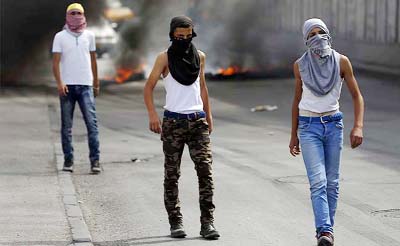
AFP, Tel Aviv :A restaurant offering discounts to Jews and Arabs who share hummus and other such gestures have been portrayed as signs of hope but in reality, fear and anger dominate amid weeks of Israeli-Palestinian unrest.As violence grips Jerusalem and other cities, a climate of suspicion has threatened even the most basic interactions between Jews and Israeli Arabs, not to mention Palestinians.Israeli authorities have long sought to stress the diverse nature of their society, with Israeli Arabs and Jews living together.But while some cities are relatively integrated, on the whole the two communities live parallel existences. Arab Israelis account for some 17.5 percent of Israel’s population.They are descendants of Palestinians who remained after the creation of Israel in 1948 and are largely supportive of Palestinians in the occupied territories.A series of gun, knife and car-ramming attacks against Jews as well as ongoing clashes between security forces and Palestinian protesters has worsened mutual mistrust.In the streets of Jerusalem and other cities, Israelis are frightened by random knife attacks, while Palestinians and Israeli Arabs fear being caught up in mob justice or shot by police.Some Israeli politicians have begun encouraging civilians to carry guns, while offices have employed armed guards.The tense atmosphere has led to tragic mistakes.In the most grim example, an Eritrean died after he was shot and then attacked by a mob on Sunday when he was wrongly thought to be involved in a gun attack that killed a soldier and wounded about 10 others.Hossam, a Palestinian student in annexed east Jerusalem, lives only three tram stations away from his work in a restaurant west of the city, but he takes a taxi because his mother is worried, checking up on him with dozens of text messages per day.He said he feels constantly watched.”If I walk with my hands in my pockets, to (Israelis) that might mean I have a gun in that pocket,” he said.Omar Jamjoon, a 20-year-old Arab employee at the Israeli bus company Egged, said he was recently assaulted by a group of Israelis after finishing work at 5:00 am.’What does that make me?’An upsurge in violence since the start of the month has seen eight Israelis killed in attacks.Some 49 Palestinians and one Arab Israeli have died, including alleged attackers and those killed in clashes with Israeli security forces.

